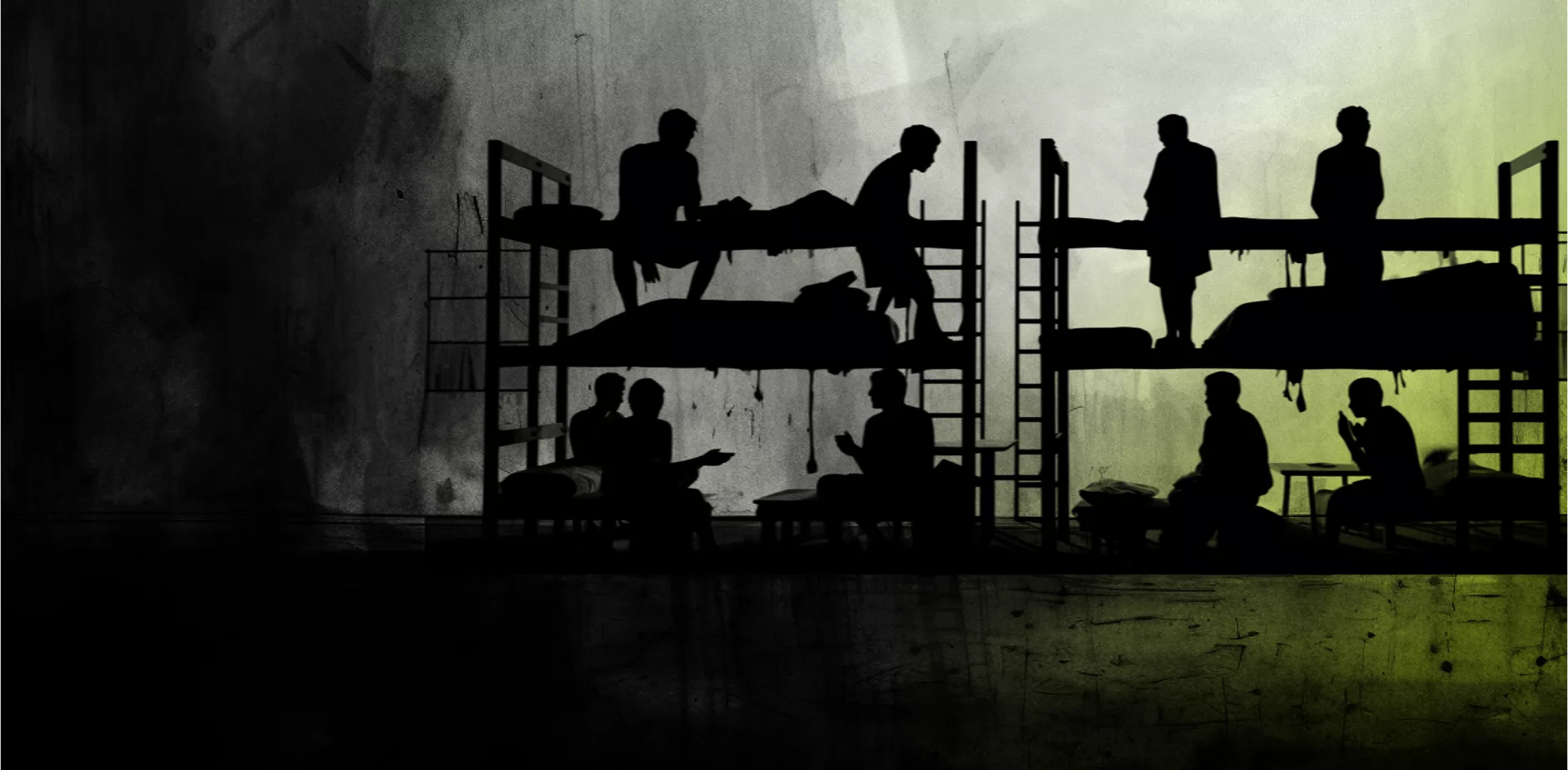
Daily life in the camp
Besides work, roll calls and fear of punishment, everyday life in Wulkow was characterised by constant hunger, a lack of medical care and (recreational) activities but also by friendships and enmities, solidarity and rivalry. Various strategies were developed to cope with the living conditions or to make the situation more bearable: solidarity campaigns or activities could help to improve treatment, forget about everyday life and/or support each other. These strategies included "flying below the radar" or "getting your hands on" something.
Rations were reduced to the bare minimum considered essential for sustaining life and thus the ability to work. Non-perishable food items were delivered by train from Theresienstadt, bread and potatoes came from the neighbouring villages. The camp commandant Franz Stuschka often used food deprivation as a collective punishment.
While some prisoners received food parcels from relatives in Theresienstadt, these were often withheld until the contents had gone mouldy or were looted by Stuschka. Hunger was therefore the pervasive condition.
"Getting your hands on" food played a major role in the prisoners' lives. For example, a long-planned break-in into the provisions barracks was successfully carried out during Stuschka's absence and provided the prisoners with a little extra food in addition to their otherwise limited rations. Another option was trading within the camp, which became more profitable after the RSHA staff had moved to the alternative site.
„During this time, I was a rich man in Wulkow because I regularly checked the toilets there and in the toilets, I always found cigarette buts and I sold those to the cook and sometimes I was given pieces of bread.“
Hanuš Hron, 2021
- © Private
Not only the food rations but also the hygienic and medical conditions in the camp were extremely inadequate and therefore life-threatening. The camp doctor, an older prisoner, had set up a treatment room and a quarantine station in a small shed - but this was mostly unoccupied, as according to Stuschka, the camp was intended exclusively for labour. The prisoners dreaded this so-called "infirmary". Even in freezing temperatures, camp commander Franz Stuschka instructed that the door remain open at all times. In addition, medical assistance was reduced to a minimum. The sick often only survived thanks to the help of their fellow prisoners. These conditions forced many prisoners to go to work, even when they were sick and running a fever.
„The witness Löwy, whose hand had frozen, asked me with raised hands to let him work with me, because he was more protected there than in the infirmary and because it was known that they were all death row prisoners who were in the infirmary.“
Otto Katz, 1947
- © Private
Aside from tales of the miserable conditions, former prisoners regularly described situations that resembled recreational activities. For example, there were some evenings in the barracks when prisoners had time to themselves. There were romantic relationships in the camp. Short humorous interludes were also welcome distractions in everyday life that helped to cheer up the prisoners and better endure the difficult living conditions in the camp.
„There were two guys. One was Heinz Frankenstein. He calls himself Henry Frank now and lives in New Jersey. And these two guys from Berlin did pantomimes, funny pantomimes. And when we stood outside after dinner, the so-called dinner, in the courtyard, they performed them. And we stood around them and laughed. They were wonderful, these short moments, you know what I mean?“
Ingeborg Kantor, 1997
Christmas 1944 was frequently mentioned as a special event. A small celebration was planned for this day, which, to everyone's surprise, was approved by Stuschka. The prisoners built a makeshift stage in a small room next to the kitchen. The prisoner Heinz Frankenstein sat on the stage, told jokes and sang songs. When Stuschka and another SS man suddenly appeared in the doorway, everyone froze, but the two sat down and ordered Frankenstein to keep going. Stuschka seemed to be enjoying himself. At one point, he even sent someone to collect the parcels sent by the relatives in Theresienstadt and distributed them. But there was a nasty aftermath. During the celebration, Stuschka ordered his men to search the prisoners' barracks where they found a carpenter's axe, which was normally handed back to the tool store after work. Stuschka suspected that someone was planning an attack on him and ordered a punitive roll call. The prisoners had to stand outside the barracks for several hours in the freezing cold. "That afternoon was the first and last bit of free time we ever experienced in Wulkow.", this is how former prisoner Walter Grundwald described it in the 1990s.
- © Private
- © Private
In addition to friendships and solidarity, there were also rivalries and enmities in the camp. Manipulation by the camp commander Franz Stuschka played a not insignificant role in fuelling these animosities, as he knew how to play the prisoners off against each other, resulting in clashes between Czech and German prisoners. However, he was by no means entirely successful: friendships, support and solidarity in the camp play an important role in many testimonies. Friendships were not only helpful in surviving these difficult times emotionally, they also helped the prisoners to maintain their will to live and to focus on the future.
„Erwin Pick was one of the carpenters. He was already 29 years old, a small guy, we called him 'Picheck'. He was one of my special friends. Sometimes he taught me a little Hebrew in the evening because he thought that we would all go to Palestine after the war.“
Herbert Kolb, 2008
- © Arbeitskreis Wulkow
